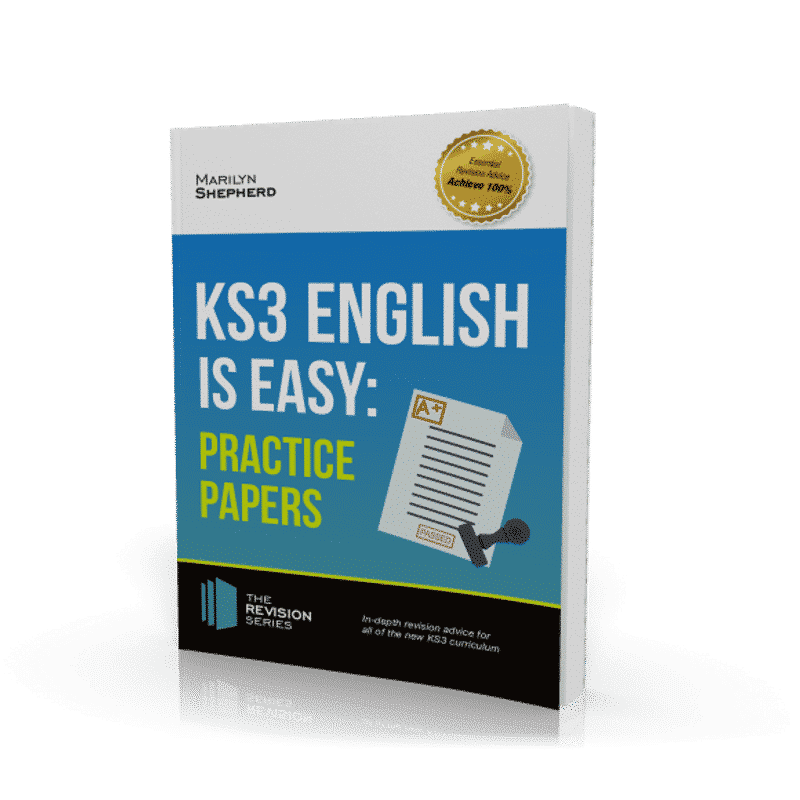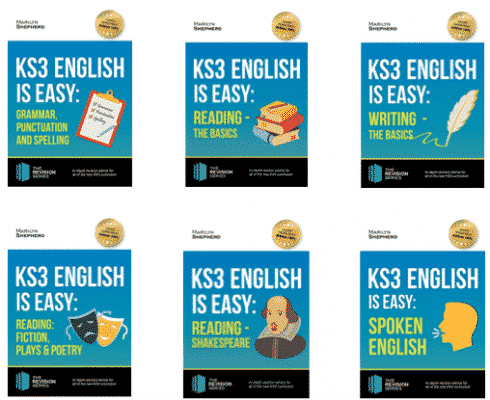KEY STAGE 3: ENGLISH PRACTICE PAPERS
Key Stage 3 is an important stage in a child’s education. These schooling years will ultimately determine which GCSE subjects they choose to study. Packed full of practice questions, reading material and writing exercises, this guide is the ULTIMATE resource to help your child prepare for their KS3 English assessments.
Ensure your child has the best chance of scoring high grades with the help of our fun, clear, and detailed revision guide!
*TWO FULL MOCK TESTS*
Key Stage 3 English Is Easy – Practice Papers
How to prepare for the Reading paper:
During the Reading paper, you should spend the first 15 minutes reading through all of the extracts that are provided. The rest of the time will require you to use the information you have read, and answer questions.
- In the real test, you will not be permitted to turn over your answer booklet until the 15 minutes reading time is up. The only booklet you will have to look at is the reading material booklet.
Carefully read through the extracts. Don’t rush through them – you have time, so make the most of it!
- I would recommend, as you are reading, to highlight key words and phrases which you think stand out or could be important. This will help you to locate these when it comes to answering the questions.
The reading paper is broken up into the following areas: you will be provided with 3 extracts, of which you will have to answer questions based on each one.
- Remember to divide your time up in order to accommodate all of the questions. You need to spend a sufficient amount of time on each extract (and set of questions), in order to make sure you finish the paper.
- I recommend that you spend approximately 20 minutes on each section. Most people tend to rush through the first set of questions, which could be costly and lose you easy marks! The key to timing is to pace yourself. Keep an eye on the clock!
Like any exam, the number of marks per question vary, and therefore I recommend that you answer the questions that award more marks first. That way, if you do run out of time, you have answered the questions that will give you four or five marks, as opposed to one or two marks.
How to prepare for the Shakespeare paper:
Your English assessments will also comprise a Shakespeare section. In the classroom, you will focus on a Shakespeare play. That play will come up in the exam, amongst other plays you have not studied. You should only answer the questions that relate to the Shakespeare play you have studied.
For the purpose of this book, we have provided two extracts: Romeo and Juliet, Othello and Macbeth. Of course, you might attend a school which these plays are not taught. However, practising a variety of literary texts and getting to grips with the types of questions will only benefit you in the long run. Practise using these questions, and then think about the types of questions that could come up about the play you have studied.
For this paper, you will be provided three extracts – one from Romeo and Juliet, one from Othello, and one from Macbeth. You will need to read the extract that you have studied. There is one question to answer which is in the form of an essay.
If you wish, you can practise all of the questions if you think it will help improve your understanding of Shakespearean literature.
Marks will be awarded for how well you analyse the extract, and demonstrate levels of understanding and interpretation. Of course, marks will also be awarded for grammar, punctuation and spelling. Remember to use the extract to pinpoint key areas you wish to discuss. Use short, relevant quotes to highlight what you are trying to say.
How to prepare for the Writing paper:
The Writing paper of the English assessment is your chance to show off your creative skills and writing ability.
During this part of the exam, you will be provided with two questions – one will require a shorter written answer, and the other a longer written answer.
Although it is quite difficult to revise and prepare for the Writing paper, there are a few things that you can consider:
- The purpose of the text:
- Are you writing to persuade, argue, entertain, give advice or describe?
- The form of the text:
- Are you writing a story, a diary entry, a letter or a newspaper article?
- The audience of the text:
- Who are you addressing your writing to? Is it a parent, a teacher, a head teacher a pupil?
The way in which you style your writing will depend on all of the aforementioned areas. The best way to enhance your writing ability is to practise writing for all of the above areas – purpose, form and audience.
As mentioned, there is a shorter and longer writing task. Therefore, you will need to allocate your time correctly in order to cater for this. Obviously, more time will be required on the longer writing task.
This assessment is not marking you based on how much you write. Instead, it is marking you based on the quality of your written communication. You need to ensure that everything you write is clear, punctual and relevant. It is best to write three strong, detailed paragraphs, as opposed to lots of paragraphs that are not relevant and waffle on.
Laid out in the style of an exam, children will be able to make the most of their practice papers, by engaging with not only the exam questions, but the format and marking scheme that is used during their assessment.
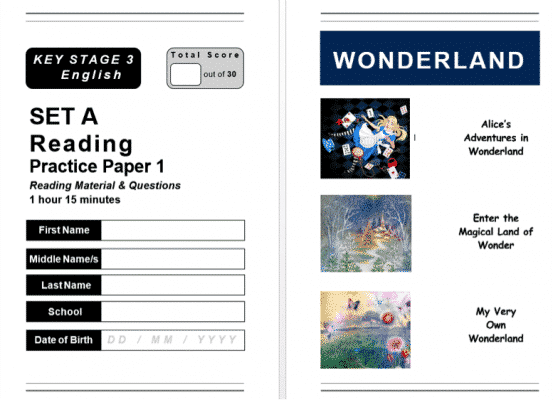
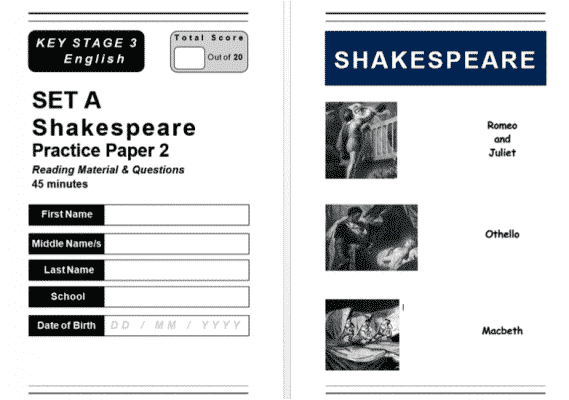
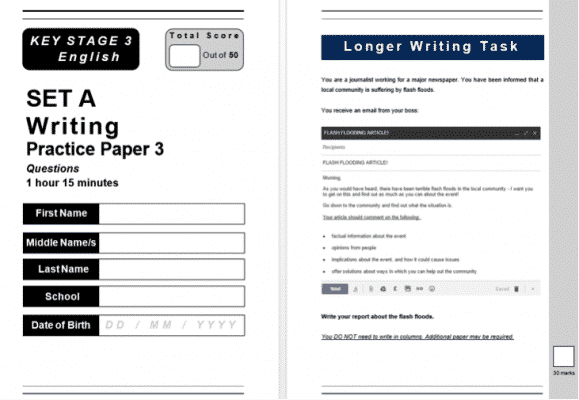
Sample KS3 English Questions
Countryside by Day; City by Night by How2Become
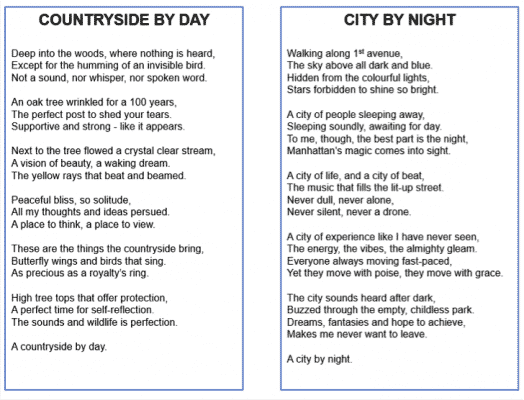
QUESTION 1
In ‘Countryside by Day’, the poet describes a peaceful, idyllic, beautiful atmosphere.
Find two examples from the poem, and describe how this links to themes of beauty and serenity.
EXAMPLE 1
EXAMPLE 2
QUESTION 2
Below is a table. Fill in the table with examples taken from the poems. Both poems may not contain the same literary devices. If so, write “N/A”.
| COUNTRYSIDE BY DAY | CITY BY NIGHT | |
| SIMILE | ||
| ALLITERATION | ||
| SOUND IMAGERY | ||
| RHYMING PATTERNS | ||
| ONOMATOPOEIA | ||
| OXYMORON |
QUESTION 3
For each poem, ‘Countryside by Day’ and ‘City by Night’, you need to create your own stanza.
When creating your stanza (one for ‘Countryside by Day’ and one for ‘City by Night’) you should consider the following:
- Language
- Structure
- Rhymes
- Imagery
Q1.
Example 1 = “Next to the tree flowed a crystal clear stream, / A vision of beauty, a waking dream”. This quote from the poem demonstrates the beauty and nature of the countryside. It represents serenity and tranquillity. The ‘crystal clear stream’ connotes peacefulness.
Example 2 = “The sounds and wildlife is perfection”. Again, the poet uses sound imagery alongside the beauty of the nature and wildlife to demonstrate the beauty and idyllic setting of the countryside.
Q2.
Simile
- “As precious as a royalty’s ring”
- N/A
Alliteration
- “Crystal clear”
- “Sleeping soundly”
Sound imagery
- “Not a sound, nor whisper, nor spoken word”
- “The music that fills the lit-up sky”
Rhyming patterns
- “Heard” “bird” “word”
- “Away” “day”
Onomatopoeia
- N/A
- “Buzzed”
Oxymoron
- “A waking dream”
- N/A
Q3.
*This is based on your own creating writing. You need to write one stanza for ‘Countryside by Day’ and one stanza for ‘City by Night’.
Marks will be awarded for language, structure, rhymes and imagery. Have someone read your stanza, and see whether you have used similar features as the poet.
FREE BONUS
When you order you will receive the following free bonus;

Plus 30-days FREE ACCESS to the Educational online testing suite. Thereafter, just £5.95 per month. No minimum term. You may cancel anytime. Cancel before the 30-days are up and you will not be charged. Online suite access on PC, MAC and mobile devices.
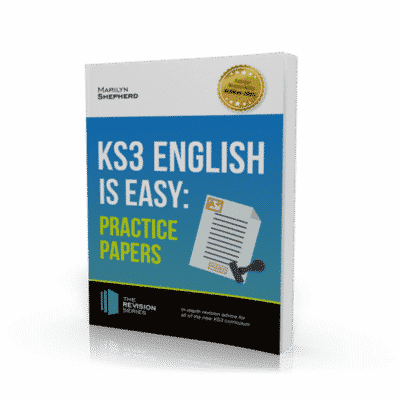
✓ 30-Day Money-back Guarantee

✓ 30-Day Money-back Guarantee
Did you know? All orders with How2Become are protected by our 30-day money-back guarantee. What ever the reason…or no reason at all…you can have your money back if this resource isn’t right for you (see our terms for full details).
